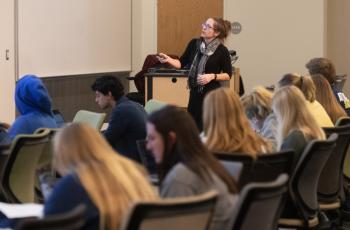 Welcome to Georgia Tech! Teaching at Tech is an exciting opportunity to work with some of the best students in the world, students who are bright, engaged, and committed to their academic success. On this page you will find access to a variety of resources that will help you learn some of the nuts and bolts of teaching at Georgia Tech, from designing your course and syllabus to creating an active learning environment in your class meetings to assessing student learning.
Welcome to Georgia Tech! Teaching at Tech is an exciting opportunity to work with some of the best students in the world, students who are bright, engaged, and committed to their academic success. On this page you will find access to a variety of resources that will help you learn some of the nuts and bolts of teaching at Georgia Tech, from designing your course and syllabus to creating an active learning environment in your class meetings to assessing student learning.
Our Teaching at Georgia Tech Guidebook is an excellent source of information about all things teaching related at Tech as well. Access the most recent version of the Guidebook here. Become more familiar with the teaching resources listed in the Guidebook by playing the Teaching Tour of Tech Escape Room. View some welcomes and advise from early-career faculty here. And Center for Teaching and Learning Faculty (CTL) are always available to work with you on any aspect of your teaching. Simply email us, and we'll get right back to you!
How Do I Get Started Designing a Course?
- Course Design Studio This program provides a structured opportunity for faculty instructors to design or redesign a course with expert guidance from CTL consultants and input from colleagues across campus. During four three-hour sessions, you will engage in activities aimed at facilitating the development of your course, while receiving support that is grounded in evidence-based best practices for course design.
- Fall Teaching Kickoff for New and Returning Faculty From developing your syllabus, to designing your Canvas course site, to deciding on your course policies, assessment plan, and teaching strategies, there is a lot for faculty to do to prepare for a new semester. Join us at the Fall Teaching Kickoff for New and Returning Faculty for guidance and support as you prepare to meet your new students. Visit the event page for details and to register.
- New Faculty Orientation Offered by the Office of the Vice Provost for Faculty in collaboration with the Center for Teaching and Learning and other additional campus units.
- Syllabus Design A well-written syllabus provides students with important information about the course, outlines the skills and knowledge they will acquire, and motivates them to prepare for class as well as introduces your teaching philosophy and style. This resource breaks down the different sections of an effective syllabus that you can model in your own syllabi.
- Effective Assessment Design How will you know if your students have learned what you want them to? What can they do to practice and demonstrate their learning throughout the course? This resource walks you through designing an effective assessment plan for your course based on your course learning objectives.
 What Policies Does Georgia Tech Have About Teaching and Academic Integrity?
What Policies Does Georgia Tech Have About Teaching and Academic Integrity?
Like every institution, Georgia Tech has specific policies that govern academics at the Institute. Because these policies may differ from those of your previous institution, becoming familiar with our policies and procedures will help you to get off on the right foot when designing your course, creating your syllabus, and working with you students. You can find a full overview of these policies in the Teaching at Georgia Tech Guidebook and in our Academic Policies Roundup.
Academic integrity is a core value and taken very seriously at Georgia Tech. Each student is expected to abide by the Honor Code: "I commit to uphold the ideals of honor and integrity by refusing to betray the trust bestowed upon me as a member of the Georgia Tech community." You can learn more about the Honor Code here.
The Office of Student Integrity is available to work with you and students to ensure each person is acting with honor, respect, and honesty in their academics. This office handles a variety of issues and concerns related to for example, cheating and plagiarism. You can learn more about acceptable and unacceptable student academic actions in section D of the Student Code of Conduct policies. OSI also offers tips for preventing academic misconduct here.
What LMS Does Georgia Tech Use, and How Can I Learn About It?
Georgia Tech uses Canvas as the primary Learning Management System (LMS). For a general overview of Canvas, view this introductory video. The Office of Instructional Technology offers a variety of excellent resources available in the knowledge base article, how to prepare for the new semester in Canvas. Training opportunities are also available. If you have specific questions about Canvas, you can contact OIT expert support.
CTL provides one-on-one consultations with learning technology experts on how to effectively integrate technologies into teaching and learning. Whether you would like to explore the best types and uses of technology for your particular teaching needs, or need assistance in course design and re-design, digital course content development, technology implementation and evaluation, we are here to help you.
How Do I Effectively Engage Students in My Courses?
- Learn more about Georgia Tech's Learning Environment and Student Body
- Technologies and Strategies for Engaging Students Engaging students in the learning process is critical for their success, especially in an online or hybrid teaching environment where instructors and learners are not physically present in the same room. What types of strategies and activities can we use to create engaging learning experiences? These modules will help you learn how to leverage various technologies and strategies to facilitate engaging learning activities inside and outside of classes.
- Facilitating Group DiscussionsWhen facilitated effectively, discussion helps students develop communication skills including close, respectful listening, clear expression, evidence-based reasoning, and intellectual agility. Learn more about effective discussion strategies in this resource.
- Teaching with the United Nations Sustainable Development Goals (Teaching & Learning Buzz podcast episode In this episode, CTL faculty member Dr. Carol Subiño Sullivan speaks with Drs. Rebecca Watts Hull and Evan Mallen about the United Nation's Sustainable Development Goals and how they can be used effectively in the classroom across disciplines and school.
How Do I Incorporate Learning Technologies in My Classes?
- Technologies and Strategies for Engaging Students Engaging students in the learning process is critical for their success, especially in an online or hybrid teaching environment where instructors and learners are not physically present in the same room. What types of strategies and activities can we use to create engaging learning experiences? These modules will help you learn how to leverage various technologies and strategies to facilitate engaging learning activities inside and outside of classes.
- Teaching with Technology Studio (July 2021, check back soon)
- Teaching with Technology Partnership Program The Teaching with Technology Partnership (TTP) is a CTL initiative that supports and promotes effective and innovative uses of technology to enhance teaching and learning. These partnerships involve collaboration between the faculty member and CTL learning technology specialist.
- Teaching with Technology Workshops (Fall 2021, check back soon)
- Teaching with Technology Resources
How Do I Design Effective Assessments of Student Learning?
- Designing an Assessment Plan Resource How will you know if your students have learned what you want them to? What can they do to practice and demonstrate their learning throughout the course? This resource walks you through designing an effective assessment plan for your course based on your course learning objectives.
- Grading and Assessment Resource Links A comprehensive list of resources on a variety of topics related to grading and assessment including formative and summative feedback strategies, connections between course objectives and grading criteria, and alternate perspectives on grading practices.
- Grading Practices at Georgia Tech and Beyond (Teaching & Learning Buzz podcast episode) CTL faculty Drs. Carol Subiño Sullivan and Rebecca Pope-Ruark share student perceptions of how grading practices at Tech impact their learning and academic wellbeing and then delve into three different types of grading strategies - traditional, norm-based, and mastery-based.
How Do Collect Feedback About My Teaching from My Students?
- Course Instructor Opinion Survey (CIOS) The Institute uses CIOS to formally collect end-of-semester feedback from students on their different courses. Your chair may discuss your CIOS data at different points in your teaching experience, and the data is used in retention, promotion, and tenure decisions as well.
- CTL Survey for Early Course Feedback Available in the Canvas Commons to be imported in your course, the CTL Survey for Early Course Feedback asks students four brief questions to help you understand what is working for their learning in the course and what might be improved.
- Early Course Feedback Focus Groups You may invite a CTL faculty member to lead an early course anonymous feedback sessions live with your students to collect feedback on what in the course is helping and could help them learn successfully in your course.
Does Georgia Tech Value Excellent Teaching?
- Thank a Teacher Program Every semester, students are invited to recognize faculty members and TAs who made an impact of them and their learning. More than 3000 Thank a Teacher recognitions were awarded in the last academic year. See what our students have to say.
- CTL Teaching Awards Each year, the Center for Teaching and Learning presents a number of awards to honor outstanding faculty contributions to the educational mission of Georgia Tech. Recipients are celebrated annually at a campus-wide event each April.
- CTL Services The Center for Teaching and Learning offers a wide range of events, groups, individual consultations, and other opportunities for faculty to actively support excellent teaching and learning at Georgia Tech.
- Multiple Measures of Teaching Effectiveness Collecting feedback about your teaching in multiple ways and from multiple perspectives is the most effective way to grow as an instructor who values excellent teaching. This resources offers a list of ways to collect feedback on your teaching that go beyond CIOS scores.